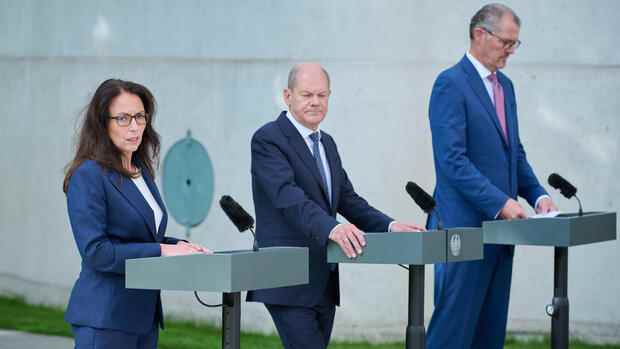The resolutions on the relief package are to be implemented quickly.
(Photo: IMAGO/Christian Spicker)
Berlin Chancellor Olaf Scholz (SPD) announced relief measures in view of the high gas prices after the meeting with representatives of employers and trade unions.
The expert commission, which is looking for solutions on behalf of the federal government, should deliver results in October, said Scholz (SPD) on Thursday. The commission will be headed by business wise man Veronika Grimm, industry president Siegfried Russwurm and the head of the IG BCE trade union, Michael Vassiliadis.
At the second meeting of the so-called concerted action – after the start at the beginning of July – in addition to DGB boss Yasmin Fahimi and employer president Rainer Dulger, representatives of the Chamber of Industry and Commerce (DIHK), the Federation of German Industries (BDI) and the individual trade unions in the Chancellery were present .
In addition to energy policy, the main topic was the government’s offer to make additional payments from companies to employees tax- and duty-free up to an amount of 3,000 euros.
Top jobs of the day
Find the best jobs now and
be notified by email.
The traffic light coalition took a total of 95 billion euros to relieve the citizens, said Scholz. “The federal government leaves no one alone with the burden.” This promise applies. The head of government said that intensive work is being done to expand the subsidy programs in order to also help companies suffering from the rise in energy prices.
Above all, however, it is about dampening the price increase. With the electricity price brake, you are on the right track, and it is now a matter of making it “realistic quickly”. Since the EU Commission has just taken a similar path, he is very optimistic, said the Chancellor.
DGB boss Fahimi emphasized that it was clear that the relief package had to arrive quickly. In addition, the unions considered further relief to be necessary, such as a new energy price flat rate of 500 euros per adult and 100 euros per child.
The offer from politicians to exempt additional payments from companies to their employees up to the amount of 3000 euros from tax and social security contributions provided a source of discussion. Employer President Dulger emphasized that the group stated that this was a voluntary and flexible instrument. Because it is clear that in view of the economic situation “not all companies can make this one-off payment”.
Unions are pushing for collective wage increases
The social partners have very different views of the possible structure. Employers would prefer to have one-off payments that do not permanently increase wage costs. However, the trade unions did not want to be restricted in their collective bargaining policy and emphasized that the exemption from taxes and duties should not only apply to one-off payments.
There must be a permanent stabilization of real wages, DGB boss Fahimi emphasized before the meeting in the ARD “Morgenmagazin”. Collective bargaining is currently taking place in the metal and electronics industry, which employs 3.9 million people.
And in the chemical industry, the collective bargaining partners want to resume the negotiations that were adjourned in April in October. One day before the concerted action, the Federal Collective Bargaining Commission of the IG BCE union had confirmed that a deal would have to bring about a “sustainable increase in purchasing power” for employees.
Before the meeting of the social partners on Thursday, it was also unclear how companies that are not bound by collective bargaining agreements will be dealt with or with sectors for which there are currently no collective bargaining negotiations in which special payments could be won.
>> Read here: Electricity price brake, direct payments, higher child benefit and local transport ticket – this is how the coalition wants to relieve the burden on citizens
That is why the employers also considered the amount of 3,000 euros promised by politicians to be unreasonably high. Tariff expert Hagen Lesch from the German Economic Institute (IW) calculated on Thursday that a tax-free payment of 3,000 euros would mean a wage increase of 6.1 percent for a full-time employee with an average gross annual salary of 49,200 euros.
Prime Minister Scholz emphasized that collective bargaining policy is of course not made in the Chancellery and that it is up to the companies whether they want to make additional payments. But the employees would certainly be happy about it.
In energy policy, the trade unions renewed their demand for a gas price cap. Employers stressed that the main way to combat the rise in energy prices was to broaden the supply. Employer President Dulger declared this week at the German Employers’ Day that taking two of the three remaining nuclear power plants into the emergency reserve is like throwing all the lifeboats overboard on the “Titanic”, letting the band play in the dining room and relying on that perhaps not so much water would penetrate and the ship would not sink.
The concerted action is scheduled to meet for its third meeting in November.
More: The state as savior in every crisis? About the fatal error of the fully comprehensive policy
